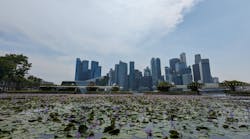Lauren Del Ciello is managing editor for Water Quality Products. Del Ciello can be reached at [email protected].
undefinedThis fall, I had the opportunity to visit the Mundelein Wastewater Treatment Plant with editors from WQP sister publication, Water & Wastes Digest. I spend the bulk of my time and creative energy focusing on drinking water and end-use water quality, so stepping into (not literally!) this aspect of the water cycle was a change of pace, to say the least. I learned a lot that day, but three key points stood out of me: the rigorous process, the role of automation and the beauty of the systems.
First, the rigorous process to ensure wastewater is treated to a high enough quality to return to the environment is multi-faceted. Depending on the plant and community water quality, some typical treatment steps include screening, grit removal, primary settling, aeration, secondary settling, filtration, disinfection and sludge treatment. Just as I’m sure many consumers don’t spend much time thinking about the efforts it takes to bring water to their tap (or treat it further once there), similarly it was eye-opening to see in-person the steps needed to treat water after it is used.
Second, automation plays a huge role in municipal water treatment. Automation can minimize room for human error and improve efficiencies. It is amazing to think of the vital role these systems have played amidst the COVID-19 global pandemic, as well as how they have evolved rapidly over the past 30-plus years.
Finally, water and wastewater treatment plants are beautiful. I know I’ve written in this space in the past about the relationship between water and art. Just as there is beauty to be found in the crisp lines of an install or the moment clean water flows from a tap for the first time, likewise there is beauty to be found in the uniform pools of a clarifier or the stark outline of a row of digesters on the horizon, lined up like sentries poised to protect our nation’s water quality.
Those who operate in the different facets of the water cycle often find themselves at odds, each protective of their own slice of the water narrative. But that’s just it; there’s a larger water narrative at play that we all have an opportunity to collaborate on. Wastewater can become drinking water and vice versa. Storm water can be treated and re-join the drinking water cycle. It’s all one water at the end of the day, whether you’re fighting to protect the water quality at the end of the tap or beyond, it’s all connected.
I’ll conclude with an unusual challenge to you: spend a little time thinking and learning about a facet of water’s story you are not as well-versed in. There is always more to learn. How can you engage with a new perspective? Perhaps it means reaching out to the local municipal water authority to partner on providing bottled water in boil-water advisories or final barrier amid contaminant concerns? Or teaming up with groundwater drillers on quality issues? Or maybe it’s as simple as asking more questions about storm water and rainwater harvesting to understand more about reuse. If you engage with my challenge, let me know at [email protected].



